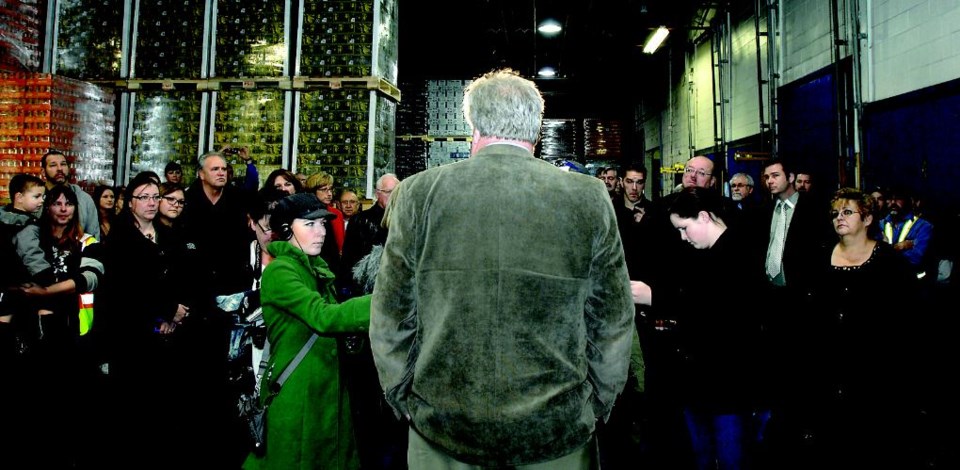Pacific Western Brewery personnel popped a few tops in celebration, Monday. The minister responsible for B.C.'s liquor regulations, Rich Coleman, found a place in amongst the mountains of beer pallets to tell the employees of the Prince George factory that they still had jobs. He told management and owner Kazuko Komatsu that they would be expected to pay more taxes on their production only if they sold more beer.
Up until that moment, PWB was facing a tax cliff of about $9 million more on their tax bill if they sold even one beer more than an old regulatory threshold of 160,000 hectalitres. That line was expected to be crossed on Tuesday or Wednesday, triggering either a multi-million-dollar tax bill or a factory shutdown.
Actually, PWB managers told The Citizen, the factory was as good as shut down in either case, if the old laws prevailed. Putting the operation on pause for the remainder of 2012 would lose so much business momentum it would be hard to recover in 2013, especially if they got close to the threshold again at the end of that year too. It would sentence PWB to forever pull up short at the 160,000 hectalitre line instead of trying to grow and expand their business.
Coleman said this was the opposite of what the government wanted, it ran counter to provincial economic expansion goals, and it made no sense to punish made-in-B.C. products for their own success.
"The important thing is for jobs in Prince George to be protected," said Coleman to a round of applause from the factory workers and other stakeholders gathered at the end of the assembly line.
The new rules will still require more taxes be paid the more beer you make, but the thresholds are progressive, not retroactive like the old system was, and go up bit by bit in 5,000 hectalitre increments. Once you get to 300,000 hectalitres, you graduate to the full tax rates paid by the mega-companies like Labatt, Molson-Coors, and Sapporo-Sleeman.
Ramping up the taxes is still not ideal for small breweries' bottom line, said PWB officials, but it is a livable compromise.
"We're happy the minister is here," said PWB brand manager Paul Mulgrew, alongside Komatsu. "We know nothing is perfect, but we are happy with this in principle. As long as it's out in the open, we will make it work."
"I'm told by the company that [whatever the consequences], it will not affect your jobs," Coleman told the assembled employees. "This has the support of the other small brewers in B.C., I was able to talk to most of them about this, and the larger companies have come to a grudging acceptance. I think it is a fair formula. It puts the small brewers in a place not only to know where they stand today but where they will stand five years from now."
WHAT ALES THIS PLAN
The opposition New Democrats said Coleman's plan makes a lot more sense than the previous rules written in 1988 for an industry that only had a handful of upstart breweries in the mix with the industry's tall cans.
It was too 11th-hour, though, and should have spent more time in the consultation process to make sure it was correct, according to liquor regulations critic Maurine Karagianis.
"We in British Columbia want to see our business thrive, so I am happy to see the government has made a move to offer a bit more assurance to those businesses, but it is so unfortunate that PWB and other brewers have had to go through levels of anxiety over the way this was rolled out," she said. "They bungled the implementation of this policy from the beginning."
She advocated putting attention on the B.C. beer industry similar to the way British Columbia wines have been promoted through the VQA system, for example, so the entire industry is fostered for large and small brewers alike.
Canada's largest brewers actually want to see the craft breweries succeed, said John Sleeman. The celebrated brewer used to be one of the nation's smallest, but now partnered with Sapporo he is among the nation's big three (Labatt and Molson-Coors, the other two).
As chair of the Brewers Association of Canada, Sleeman said the new tax structure in B.C. should help foster those companies.
"It creates interest in the beer industry. It develops our audience if you will. Our issue is only that it needs to be fair and a level playing field," he said.
Because one set of brewers has to pay one tax rate, and others pay a lesser rate, the smaller amount is nothing short of a subsidy, said Sleeman. It isn't fair, but there are so many different tax structures and retailing regulation structures across Canada that no system is going to be perfect for all.
"We applaud the B.C. government's latest move today to make it easier for brewers who are getting close to the fiscal cliff," Sleeman said. "To have the B.C. government wean the brewers off the assistance as they climb higher up to 300,000 hectalitres is a better way to go. We certainly understand and support the various governments across the country that want to help small brewers. Small breweries are popping up everywhere, and consensus is - small and large alike - that there should be some sort of consistency."
Other small breweries in Canada do not have the same easy rates B.C. provides small brew companies, said Sleeman, yet they still progress profitably.
"I think it is yet one more indication that there needs to be a full review of liquor distribution in the province," Karagianis said. "We need fair, balanced policies that are in keeping with the 21st century."



.png;w=120;h=80;mode=crop)